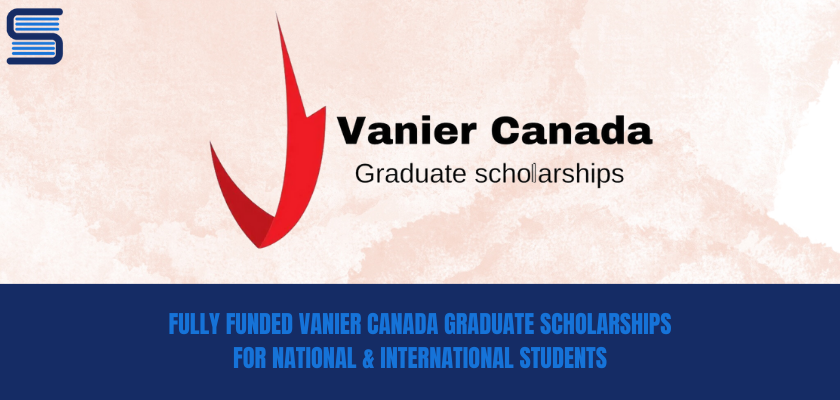Applications are currently being accepted for the Vanier Canada Graduate Scholarships in Canada, which provide full funding for both national and international students. Annually, up to 166 scholarships are offered through the Vanier Canada Graduate Scholarships program.
The Vanier Scholarship supports doctoral degree (Ph.D.) programs, as well as combined MA/PhD, MD/Ph.D., and Masters leading to Ph.D. programs. This scholarship is generously funded by the Government of Canada. Recipients of the Vanier Canada Scholarship will have the opportunity to pursue their studies at any Canadian university of their choice, with all expenses covered by the scholarship.
The Vanier CGS provides a financial award of $50,000 per year for a duration of up to three years. Additionally, don’t forget to explore the Heinrich Boll Foundation Scholarships 2023 in Germany.
Details:
| Funded by | Government of Canada |
| Country | Canada |
| Degree | Master leading to Ph.D. & PhD |
| Deadline | 1-Nov-23 |
Duration:
The funding provided has a duration of three years.
Citizenship:
- Canadian citizens
- Permanent residents of Canada
- Foreign citizens
Areas of Research:
The Vanier Canada Graduate Scholarships support research in the following areas:
- Health research
- Natural sciences and/or engineering
- Social sciences and humanities
Eligibility Criteria for Vanier CGS Application:
To be considered eligible for the Vanier Canada Graduate Scholarships (CGS), you must meet the following requirements:
- Nomination: You must be nominated by a single Canadian institution that has been allocated a Vanier CGS quota.
- Degree Pursuit: You should be pursuing your first doctoral degree, which includes joint programs like MD/Ph.D., DVM/Ph.D., or JD/Ph.D., provided they have a significant research component.
- Intent to Pursue Studies: You must intend to engage in full-time doctoral studies and research, either in the upcoming summer semester or academic year following the announcement of results, at the institution that nominated you.
- Length of Study: As of May 1, 2024, you should have completed no more than 20 months of full-time study in your doctoral program. This count begins after the completion of your master’s degree, as the doctoral program follows it. The calculation includes the months of study from your doctoral enrollment date.
- Joint Graduate Research Program: If you are enrolled in a joint graduate research program, such as MD/Ph.D., MA/Ph.D., or DVM/Ph.D., you should have completed no more than 32 months of full-time study by May 1, 2024. This 32-month limit applies regardless of whether you were previously enrolled in a master’s program. The calculation starts from the official registration date in the joint program, including the master’s portion.
- Bachelor to Ph.D. Transition: If you directly transitioned from a bachelor’s degree to a Ph.D. program without prior enrollment in a master’s program, the calculation of months of study starts from your doctoral enrollment date.
- Previous Master’s Enrollment: If you were previously enrolled in a master’s program but did not complete the degree, the calculation of months of study starts from your original master’s enrollment date.
- Academic Excellence: You must have achieved a first-class average in each of the last two years of full-time study or its equivalent, as determined by your institution. It is recommended to contact your institution for their specific definition of a first-class average.
- Scholarship or Fellowship: To undertake or complete a doctoral program, you should not currently hold or have previously held a doctoral-level scholarship or fellowship from CIHR, NSERC, or SSHRC.
Please note that only the Ph.D. portion of a joint program is eligible for funding under the Vanier CGS.
Program of Study Eligibility:
A doctoral program is considered eligible if it incorporates a significant research component that culminates in the completion of a thesis, major research project, dissertation, scholarly publication, performance, recital, or exhibit. This component must undergo merit/expert review at the institutional level as a requirement for program completion. Joint graduate research programs that combine a professional degree (e.g., MD/PhD, DVM/PhD, JD/PhD) and clinically-oriented programs such as clinical psychology are also eligible if they include a substantial autonomous research element as described above.
Evaluation Criteria:
Nominees for the Vanier CGS will be assessed based on three equally weighted criteria by the selection committees:
- Academic Excellence
- Research Potential
- Leadership (potential and demonstrated ability)
Application Documents:
Individual application documents can be submitted in English or French. In cases where another language is necessary to express a specific idea (e.g., a specialized concept), an explanation should be provided in either French or English.
A complete Vanier CGS application package includes:
- ResearchNet application form (including two letters of reference with three sections each)
- Canadian Common CV (CCV) (with limited entries; see Completing the Common CV (CCV) for detailed information)
- Research Contributions (maximum one page)
- Personal Leadership Statement (maximum 2 pages for English applications; maximum 2.5 pages for French applications)
- Special Circumstances (maximum 0.5 page, optional)
- Two Leadership letters of reference (maximum 2 pages each)
- Research Proposal (maximum 2 pages for English applications; maximum 2.5 pages for French applications)
- Project References (maximum 5 pages)
- Transcripts
Deadline: For students:
Please consult your nominating institution for the submission deadline.
For nominating institutions: Deadline: November 1, 2023 (20:00 EDT).
How to Apply (Step-by-Step Guide):
Step 1: Confirm eligibility
Step 2: Contact your desired nominating institution
Step 3: Register for a ResearchNet account and Canadian Common CV (CCV) account, and complete the Self-ID Questionnaire
Step 4: Create CCV using the Vanier-Banting Academic template and link it to the ResearchNet application
Step 5: Initiate a ResearchNet application
Step 6: Identify the area of research
Step 7: Identify participants.
Step 8: Identity referees
Step9: Enter degree information
Step10: Enter proposal information and provide supporting documents
Step 11: Attach any other application materials (optional).
Step12: Confirm the submission of documents
Step13: Preview application materials
Step14: Provide consent and submit the application
Step 15: Adhere to presentation standards for the attached documents.

